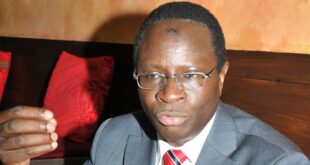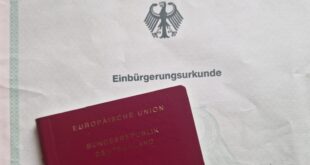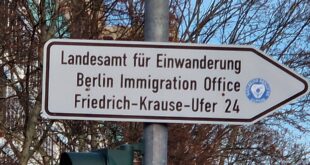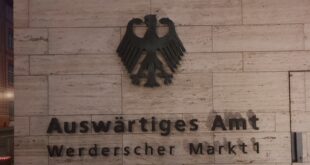Germans will go to the polls on 26 September 2021 to vote for a new Bundestag, the lower house of the federal parliament, which is elected every four years by free, secret and direct ballot. A special report by The African Courier on the election:
———
The Bundestag
The Bundestag is the elected representation of the German people. And being vested with decisive legislative authority, it’s the most important governance body.
Voters in Germany do not directly elect the chancellor, who is the head of the government. The chancellor is elected by the new parliament, which must convene for the first time not later than one month after the election.
This year’s election will determine the successor of Chancellor Angela Merkel, who is not running for another term after 16 years at the helm of the federal government
Who will succeed Chancellor Angela Merkel?
There are three leading candidates for chancellor – Olaf Scholz of the SPD, Armin Laschet (CDU) and Annalena Baerbock (The Greens).
Normally, no single party is able to singlehandedly form a federal government in Germany. The top candidate from the party that wins the most votes usually manages to forge a coalition.

Who can vote?
Citizens aged 18 and over who are eligible to vote.
60.4 million people are eligible to vote – 31.2 million women and 29.2 million men – at the election on 26 September 2021. The number of eligible voters has therefore gone down by around 1.3 million compared to the 2017 Bundestag election.
Almost half of all eligible voters live in the three large federal states of North Rhine-Westphalia (12.8 million), Bavaria (9.4 million) and Baden-Württemberg (7.7 million).
The Parties
There are 54 parties allowed to contest the election having fulfilled the necessary conditions. In the 2017 general election there were 48, of which 42 actually took part. This year 47 parties are participating.
Seven parties with 709 members are currently represented in the 19th Bundestag. These are CDU, CSU, SPD, AfD, FDP, The Left party, and Alliance 90/The Greens.
READ MORE Germany’s political parties — what you need to know
Ever since the first Bundestag election in 1949, the CDU and its sister party CSU, which only stands for elections in Bavaria, have formed a single parliamentary party. Hence the use of CDU/CSU to describe the coalition of both parties.
Which party enters Parliament?
Voters receive a simple ballot with two choices – one for a district representative and one for a party.
The first vote or “Erststimme” for the district representative, follows a first-past-the-post system. The voter selects his or her favourite candidate to represent their district in the parliament.

To enter parliament, the parties have to gain at least five percent of the second votes (the “five-percent hurdle”). Only parties that have received at least five per cent of all second votes nationwide may enter the Bundestag.
The five-per-cent-clause prevents too many small parties from being represented in the parliament, a circumstance that would make the formation of a government coalition more difficult.
Every candidate who wins one of Germany’s 299 constituencies – which are divided up per 250,000 inhabitants – is guaranteed a seat.
If a party wins direct mandates in three or more constituencies, meaning the candidates it fields there gain the most first votes, it may also send representatives to the Bundestag.
Technically speaking half the 598 seats in the Bundestag are allocated by means of the parties’ state lists (the second vote) and the other half by the direct election of candidates in the 299 constituencies (the first vote).
What makes the elections particularly interesting is that the ballot allows voters to split their vote amongst parties, perhaps voting for their local SPD candidate in the first vote, but casting their ballot for the Greens in the second vote, to help both potential coalition partners.

Sometimes, a party will receive more direct parliament seats through the first vote than they won according to the party vote. For example, if the second vote entitles a party to 100 seats, but 110 of its candidates have been directly elected on the first vote, the additional ten may enter parliament. Lest the other parties are thereby disadvantaged, they too are allocated further seats on the basis of percentage.
Since each candidate who wins a district is guaranteed a seat, the party gets to maintain those “overhang” seats.
Other parties then also get more seats to make up for this, ultimately making the parliament larger than its base number of 598 seats.
Due to this, there are currently 709 seats in the Bundestag.
What are the main issues in the campaign?
The dominating issues have been the minimum wage, the Hartz IV unemployment benefit, climate protection, the coronavirus pandemic and internal security.
Who is likely to win?
According to polls conducted seven days ahead of the Bundestag elections, the current Grand Coalition of CDU/CSU and SPD would almost no longer have a governing majority. A coalition of CDU/CSU and SPD with the FDP would have a larger majority. But a “Jamaica coalition” of CDU/CSU, Greens and FDP would also be feasible.
Possible majorities without the CDU/CSU are a so-called “traffic light coalition” of SPD, Greens and FDP and a left-wing coalition with SPD, Greens and Left.
The government is headed by the Chancellor, who is usually the candidate of the party that has the majority in the coalition.
Femi Awoniyi/© AfricanCourierMedia
Additional materials from DW, Deutschland and ZDF were used to prepare this report
READ ALSO Why voters with migrant background could decide Germany’s general election
 THE AFRICAN COURIER. Reporting Africa and its Diaspora! The African Courier is an international magazine published in Germany to report on Africa and the Diaspora African experience. The first issue of the bimonthly magazine appeared on the newsstands on 15 February 1998. The African Courier is a communication forum for European-African political, economic and cultural exchanges, and a voice for Africa in Europe.
THE AFRICAN COURIER. Reporting Africa and its Diaspora! The African Courier is an international magazine published in Germany to report on Africa and the Diaspora African experience. The first issue of the bimonthly magazine appeared on the newsstands on 15 February 1998. The African Courier is a communication forum for European-African political, economic and cultural exchanges, and a voice for Africa in Europe.






























